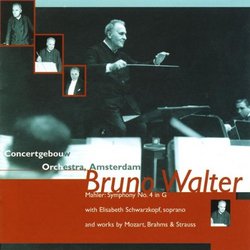| All Artists: Mahler; Mozart; Strauss; Brahms, Bruno Walter, Concertgebow Orchestra; Philharmonic-Symphony Orchestra, Elizabeth Schwarzkopf Title: Bruno Walter: A Complete Concertgebouw Concert Members Wishing: 0 Total Copies: 0 Label: Music & Arts Program Original Release Date: 1/1/2006 Release Date: 1/1/2006 Genre: Classical Styles: Forms & Genres, Theatrical, Incidental & Program Music, Historical Periods, Classical (c.1770-1830), Modern, 20th, & 21st Century, Symphonies Number of Discs: 2 SwapaCD Credits: 2 UPC: 017685109027 |
Search - Mahler; Mozart; Strauss; Brahms, Bruno Walter, Concertgebow Orchestra; Philharmonic-Symphony Orchestra :: Bruno Walter: A Complete Concertgebouw Concert
 | Mahler; Mozart; Strauss; Brahms, Bruno Walter, Concertgebow Orchestra; Philharmonic-Symphony Orchestra Bruno Walter: A Complete Concertgebouw Concert Genre: Classical
|
Larger Image |
CD Details |
CD ReviewsWalter's Mellow Spirit Thomas F. Bertonneau | Oswego, NY United States | 08/07/2001 (4 out of 5 stars) ""American Record Guide" recently updated their "Mahler Overview," with a surprising consensus that Bruno Walter was not the one to unlock the musical secrets of his friend and mentor. "Chacun à son goût," as the French say. Walter emphasized the lyrical, the Schubertian side of Mahler, leaving the modernism and the deepest "Angst" to his immediate successors - Mitropoulos and Bernstein. More than anyone else, Walter argued Mahler's case in the concert-hall and pioneered in recording the symphonies. His Vienna recording of the Ninth Symphony, taken from concert in 1938, is one of the great phonographic documents, as is his Vienna performance of "Das Lied von der Erde" from two years earlier. For Columbia, beginning in 1947, Walter made a spate of Mahler sets, including the First, Second, Fourth, Fifth, and Ninth Symphonies and two recordings of "Das Lied," the second of them in stereo. Columbia had scheduled him to record the Third Symphony, but he died before this could happen. Aside from the commercial recordings, a large number of broadcast archives have come to light, to be issued by different companies, of Walter doing Mahler. The chief attraction on the new Music and Arts set, devoted mainly to a 1952 program with the Concertgebouw Orchestra, is Mahler's Fourth, with Elisabeth Schwarkopf delivering the vocal solo in the Finale. The other items in the set are Mozart's Symphony K 550 and Strauss' "Don Juan." As a substantial filler on Disc 2, we get a New York Philharmonic performance of Brahms' Fourth from 1951. (For legal reasons the notes list the band as "the Philharmonic-Symphony Orchestra.") The Walter/Mahler 4 discography looks like this: *With Debi Halban, NYPO, 1945 (Sony) [Commercial Recording] *With Elizabeth Schwarzkopf, CBO, 1951 (M&A) [From Transcription Discs] *With Irmgard Seefried, NYPO, 1953 (M&A) [From Off-Air (FM) Magnetic Tape] *With Elizabeth Schwarzkopf, Vienna Philharmonic, 1960 (M&A [nla]) My unqualified ranking of these would be: first, the NYPO 1953 performance with Seefried; second, the NYPO 1947 commercial issue with Halban; third, the 1951 CBO performance with Schwarzkopf; and fourth, the 1960 "Farewell Concert" from Vienna. But it's not so simple. The 1952 Amsterdam performance certainly equals, and perhaps surpasses, either New York performance in orchestral terms; the Dutch players knew this work from having played it with Willem Mengelberg many times and they respond to Walter with autumnal nostalgia. The Concertgebouw strings bring a richer sound to the score than their Manhattan counterparts of some five years earlier. One must say, however, that Schwarzkopf misunderstands what her part requires, and that she sings as though addressing herself to an operatic role. She burdens both Walter's Vienna Philharmonic "Farewell" and the Klemperer EMI stereo recording in the same way. If only we had the Amsterdam reading in the FM quality sound of New York 1953 and with Seefried instead of Schwarzkopf! Even so, the Walter-Amsterdam performance is worth having and makes this set desirable; nor is it sonically objectionable in Maggie Payne's re-mastering. The slow movement endears itself especially, being infused with unembarrassed sentiment. The Mozart and Strauss items are both well-played and the Strauss, particularly, seems outstanding. (Listen to the CBO horns!) The 1951 New York Brahms Fourth is a powerful performance that looks forward to Walter's late-in-life stereo recording with the "Columbia Symphony" for CBS, one of the best ever. Walter fans should not pass up this attractively presented Music and Arts release. The booklet could supply more information than it does about the Concertgebouw program, but that's a minor criticism." This makes sense Tommy Nielsen | Swords, Co. Dublin Ireland | 04/02/2003 (5 out of 5 stars) "The opening bar of Mahler's 4th is always very revealing as to what follows. The 'silly' bell pling-pling followed by the strings playing the first major theme. I say silly because the do sound silly - well in most recordings. Most conductors fail to get the idea, the bells are not put in context but often merely played as a little introduction to the main string theme and totally lacking in coherence. Not even a seasoned Mahlerian like Szell understood this. Nor Boulez (but there is so much about Mahler he fails to understand!).But listen to Walter --- the bells ringing in the theme. Followed by the inclination of the strings, as if an invitation to dance. Walter knew what he was doing. The purpose and the spirit of this music. Schwarzkopf does not let us down either." A legendary performance! Hiram Gomez Pardo | Valencia, Venezuela | 02/26/2007 (5 out of 5 stars) "
Among the innumerable artistic feats in Bruno Walter's career, we should remind his invaluable contribution with this legendary thousand carats Orchestra, the Concertgebouw.of Amsterdam. Both factors enhanced one each other to shine with majestic intensity and superb expression in these historical performances. You should not miss these anthological musical treasures. " |

 Track Listings (8) - Disc #1
Track Listings (8) - Disc #1